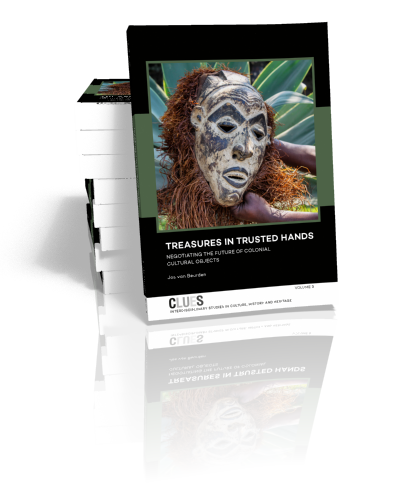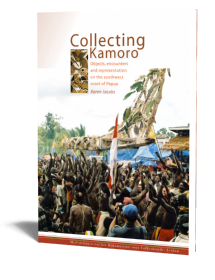Treasures in Trusted Hands
Negotiating the Future of Colonial Cultural Objects
Jos van Beurden | 2017

Treasures in Trusted Hands
Negotiating the Future of Colonial Cultural Objects
Jos van Beurden | 2017
Paperback ISBN: 9789088904394 | Hardback ISBN: 9789088904400 | Imprint: Sidestone Press Dissertations | Format: 182x257mm | 290 pp. | CLUES no. 3 | Series: CLUES | Language: English | Keywords: anthropology, ethnology, museology, colonialism, colonial objects | download cover
Read online or downloaded 4868 times
-
Digital & Online access
This is a full Open Access publication, click below to buy in print, browse, or download for free.
-
Buy via Sidestone (EU & UK)
-
Buy via our Distributors (WORLD)
For non-EU or UK destinations you can buy our books via our international distributors. Although prices may vary this will ensure speedy delivery and reduction in shipping costs or import tax. But you can also order with us directly via the module above.
UK international distributor
USA international distributor
-
Bookinfo
Paperback ISBN: 9789088904394 | Hardback ISBN: 9789088904400 | Imprint: Sidestone Press Dissertations | Format: 182x257mm | 290 pp. | CLUES no. 3 | Series: CLUES | Language: English | Keywords: anthropology, ethnology, museology, colonialism, colonial objects | download cover
Read online or downloaded 4868 times

We will plant a tree for each order containing a paperback or hardback book via OneTreePlanted.org.
This pioneering study charts the one-way traffic of cultural and historical objects during five centuries of European colonialism. It presents abundant examples of disappeared colonial objects and systematises these into war booty, confiscations by missionaries and contestable acquisitions by private persons and other categories. Former colonies consider this as a historical injustice that has not been undone.
Former colonial powers have kept most of the objects in their custody. In the 1970s the Netherlands and Belgium returned objects to their former colonies Indonesia and DR Congo; but their number was considerably smaller than what had been asked for. Nigeria’s requests for the return of some Benin objects, confiscated by British soldiers in 1897, are rejected.
As there is no consensus on how to deal with colonial objects, disputes about other categories of contestable objects are analysed. For Nazi-looted art-works, the 1998 Washington Conference Principles have been widely accepted. Although non-binding, they promote fair and just solutions and help people to reclaim art works that they lost involuntarily.
To promote solutions for colonial objects, Principles for Dealing with Colonial Cultural and Historical Objects are presented, based on the 1998 Washington Conference Principles on Nazi-Confiscated Art. They are part of a model to facilitate mediation in disputes about them.
Europe, the former colonisers, should do more pro-active provenance research into the acquisitions from the colonial era, both in public institutions and private collections.
“This is a very commendable treatise which has painstakingly and with detachment explored the emotive issue of the return of cultural objects removed in colonial times to the metropolis. He has looked at the issues from every continent with clarity and perspicuity.”
Prof. Folarin Shyllon (University of Ibadan)
“A monumental work of high quality. The Chapter on Congo is particularly well documented and instructive.”
Dr. Guido Gryseels (Director-General of the Royal Museum for Central Africa in Tervuren)
CLUES is an international scientific series covering research in the field of culture, history and heritage which have been written by, or were performed under the supervision of members of the research institute CLUE+.
This publication is part of the CLUES series
Bookpresentation:

Part I: Introduction
Chapter 1: A neglected issue in an evolving world
1.1. Decisive experiences:
1.2. Changes that matter
1.3. Main questions and approaches
Chapter 2: On colonial cultural objects
2.1. Return
2.2. Cultural objects
2.3. Typology of colonial cultural objects
2.3.1. Gifts to colonial administrators and institutions
2.3.2. Objects acquired during private expeditions
2.3.3. Objects acquired during military expeditions
2.3.4. Missionary collecting
2.3.5. Archives
Part II: Colonialism and cultural objects
Chapter 3: Colonial expansion
3.1. Early migration of objects to Europe
3.2. Meagre protection
Chapter 4: Settler and exploitation colonialism
4.1. Peak in migration of objects
4.2. Protection and preservation measures
Chapter 5: Decolonisation, the first claims and the ongoing seepage of objects
5.1. Whimsicalities in collecting
5.2. Early (calls for) returns
5.3. Drain of cultural objects before and after independence
5.4. Decolonisation, an unresolved conflict
Part III: Colonial cultural objects and the law
Chapter 6.: Increasing protection?
6.1. Hard law international instruments
6.2. Soft law international instruments
6.2.1. Instruments for the repatriation of human remains
6.2.2. Instruments for the restitution of Nazi-looted art
6.2.3. A human rights and a justice perspective
Part IV: Ambiguities between the Netherlands and Indonesia
Chapter 7: The 1975 Joint Recommendations
7.1. Cultural heritage policy until 1949
7.2. Negotiations between 1949 and 1975
7.3. Towards an agreement
7.4. Dynamics of the agreement’s implementation
Chapter 8: New insights into the Joint Recommendations
8.1. New research findings
8.2. The 1975 agreement: lessons for other bilateral negotiations
Part V: Approaches in other bilateral agreements
Chapter 9: The 1970 agreement between Belgium and Congo
9.1. Cultural policies up to independence
9.2. Deliberations and transfer of objects
Chapter 10: Nordic model for Denmark, Iceland and Greenland?
10.1. Scandinavian colonialism
10.2. Danish colonial collecting
10.3. Ancient sagas back to Iceland
10.4. Peculiar agreement with Greenland
Chapter 11: Melanesian model for Australia and Papua New Guinea?
11.1. Colonial collecting in Papua New Guinea
11.2. The process of return
Chapter 12.: The Benin Dialogue (2010 – ….)
12.1. Dispersal over Europe and North America
12.2. Prelude to the dialogue
12.3. The dialogue
12.4. Elements for the model
Part VI: New insights, a new approach
Chapter 13: The neglected effect of colonialism
13.1. Towards an overview of the colonial one-way traffic
13.2. Overview of returns so far
13.3. Returns and other categories of contested objects
Chapter 14: A new commitment and a new approach
14.1. Principles for dealing with colonial cultural and historical objects
14.2. A model for negotiating the future of colonial cultural objects

Dr. Jos van Beurden
Jos van Beurden was born in 1946 in the Netherlands. After obtaining his gymnasium diploma, he graduated in 1970 in law. His main subjects were philosophy of law (Utrecht University) and conflict studies (Groningen University). His focus was on the inequality between the (then so-called) Third World and the Western world.
Abstract:
This pioneering study charts the one-way traffic of cultural and historical objects during five centuries of European colonialism. It presents abundant examples of disappeared colonial objects and systematises these into war booty, confiscations by missionaries and contestable acquisitions by private persons and other categories. Former colonies consider this as a historical injustice that has not been undone.
Former colonial powers have kept most of the objects in their custody. In the 1970s the Netherlands and Belgium returned objects to their former colonies Indonesia and DR Congo; but their number was considerably smaller than what had been asked for. Nigeria’s requests for the return of some Benin objects, confiscated by British soldiers in 1897, are rejected.
As there is no consensus on how to deal with colonial objects, disputes about other categories of contestable objects are analysed. For Nazi-looted art-works, the 1998 Washington Conference Principles have been widely accepted. Although non-binding, they promote fair and just solutions and help people to reclaim art works that they lost involuntarily.
To promote solutions for colonial objects, Principles for Dealing with Colonial Cultural and Historical Objects are presented, based on the 1998 Washington Conference Principles on Nazi-Confiscated Art. They are part of a model to facilitate mediation in disputes about them.
Europe, the former colonisers, should do more pro-active provenance research into the acquisitions from the colonial era, both in public institutions and private collections.
“This is a very commendable treatise which has painstakingly and with detachment explored the emotive issue of the return of cultural objects removed in colonial times to the metropolis. He has looked at the issues from every continent with clarity and perspicuity.”
Prof. Folarin Shyllon (University of Ibadan)
“A monumental work of high quality. The Chapter on Congo is particularly well documented and instructive.”
Dr. Guido Gryseels (Director-General of the Royal Museum for Central Africa in Tervuren)
CLUES is an international scientific series covering research in the field of culture, history and heritage which have been written by, or were performed under the supervision of members of the research institute CLUE+.
This publication is part of the CLUES series
Bookpresentation:

Contents
Part I: Introduction
Chapter 1: A neglected issue in an evolving world
1.1. Decisive experiences:
1.2. Changes that matter
1.3. Main questions and approaches
Chapter 2: On colonial cultural objects
2.1. Return
2.2. Cultural objects
2.3. Typology of colonial cultural objects
2.3.1. Gifts to colonial administrators and institutions
2.3.2. Objects acquired during private expeditions
2.3.3. Objects acquired during military expeditions
2.3.4. Missionary collecting
2.3.5. Archives
Part II: Colonialism and cultural objects
Chapter 3: Colonial expansion
3.1. Early migration of objects to Europe
3.2. Meagre protection
Chapter 4: Settler and exploitation colonialism
4.1. Peak in migration of objects
4.2. Protection and preservation measures
Chapter 5: Decolonisation, the first claims and the ongoing seepage of objects
5.1. Whimsicalities in collecting
5.2. Early (calls for) returns
5.3. Drain of cultural objects before and after independence
5.4. Decolonisation, an unresolved conflict
Part III: Colonial cultural objects and the law
Chapter 6.: Increasing protection?
6.1. Hard law international instruments
6.2. Soft law international instruments
6.2.1. Instruments for the repatriation of human remains
6.2.2. Instruments for the restitution of Nazi-looted art
6.2.3. A human rights and a justice perspective
Part IV: Ambiguities between the Netherlands and Indonesia
Chapter 7: The 1975 Joint Recommendations
7.1. Cultural heritage policy until 1949
7.2. Negotiations between 1949 and 1975
7.3. Towards an agreement
7.4. Dynamics of the agreement’s implementation
Chapter 8: New insights into the Joint Recommendations
8.1. New research findings
8.2. The 1975 agreement: lessons for other bilateral negotiations
Part V: Approaches in other bilateral agreements
Chapter 9: The 1970 agreement between Belgium and Congo
9.1. Cultural policies up to independence
9.2. Deliberations and transfer of objects
Chapter 10: Nordic model for Denmark, Iceland and Greenland?
10.1. Scandinavian colonialism
10.2. Danish colonial collecting
10.3. Ancient sagas back to Iceland
10.4. Peculiar agreement with Greenland
Chapter 11: Melanesian model for Australia and Papua New Guinea?
11.1. Colonial collecting in Papua New Guinea
11.2. The process of return
Chapter 12.: The Benin Dialogue (2010 – ….)
12.1. Dispersal over Europe and North America
12.2. Prelude to the dialogue
12.3. The dialogue
12.4. Elements for the model
Part VI: New insights, a new approach
Chapter 13: The neglected effect of colonialism
13.1. Towards an overview of the colonial one-way traffic
13.2. Overview of returns so far
13.3. Returns and other categories of contested objects
Chapter 14: A new commitment and a new approach
14.1. Principles for dealing with colonial cultural and historical objects
14.2. A model for negotiating the future of colonial cultural objects

Dr. Jos van Beurden
Jos van Beurden was born in 1946 in the Netherlands. After obtaining his gymnasium diploma, he graduated in 1970 in law. His main subjects were philosophy of law (Utrecht University) and conflict studies (Groningen University). His focus was on the inequality between the (then so-called) Third World and the Western world.
-
Digital & Online access
This is a full Open Access publication, click below to buy in print, browse, or download for free.
-
Buy via Sidestone (EU & UK)
-
Buy via our Distributors (WORLD)
For non-EU or UK destinations you can buy our books via our international distributors. Although prices may vary this will ensure speedy delivery and reduction in shipping costs or import tax. But you can also order with us directly via the module above.
UK international distributor
USA international distributor
- Browse all books by subject
-
Search all books

We will plant a tree for each order containing a paperback or hardback book via OneTreePlanted.org.
You might also like:
© 2026 Sidestone Press KvK nr. 28114891 Privacy policy Sidestone Newsletter Terms and Conditions (Dutch)








